No matter what your athletic or fitness level is, protein is key to fueling your body. The macronutrient works to carry oxygen throughout the body and support muscle mass growth. (1, 2) While protein is a crucial component to a well-balanced diet, there are a variety of reasons why someone might need a protein supplement to help them fully meet their nutrition goals.
But finding a clean, allergen-friendly protein powder that actually tastes good? This is the real challenge. With so many protein powder options on the market, it’s easy to get lost in ingredient lists and nutrition labels. That’s where Orgain steps up. Most commonly known for its focus on high-quality, plant-based products with a clean ingredient list, the company supplies a variety of protein-focused supplements that can contribute to a number of fitness and nutrition goals.
Our team of nutrition professionals, certified trainers, and protein powder enthusiasts has tested over 40 protein powders, so we know what works. In this Orgain protein powder review, we’re breaking down the entire lineup, comparing formulas, costs, and more to bring you the inside scoop. (And help you decide which one is worth adding to your arsenal, too.)
Editor’s choice: Orgain Organic Protein Plant-Based Protein Powder
With its balanced nutritional profile and versatility, Orgain Organic Plant-Based Protein Powder earns our editor’s choice. With 21 grams of protein sourced from a blend of three plants, it covers all nine essential amino acids and provides fiber, which may help with satiety and support recovery. It’s USDA Organic and available in over 10 flavors, blending smoothly into shakes or recipes without added artificial sweeteners—offering a practical option for those focused on clean, straightforward nutrition.
Medical disclaimer: This article is intended for educational and informational purposes only. It is not intended as a substitute for medical advice. For health advice, contact a licensed healthcare provider.
Protein powders available from Orgain
- Orgain Organic Protein Plant-Based Protein Powder
- Orgain Simple Organic Plant-Based Protein Powder
- Orgain Organic Protein and Greens
- Orgain Keto Plant Protein
- Orgain Organic Protein and Superfoods
- Orgain Nut Butter Protein Powder
- Orgain Sport Protein Organic Plant-Based Protein Powder
- Orgain Grass-Fed Whey Protein Powder
- Orgain Perfect Meal Powder
- Orgain Plant Protein Plus Collagen
- Orgain Organic Protein and Oatmilk
- Orgain Kids Protein Nutrition Shake Mix
Compare Orgain protein powders
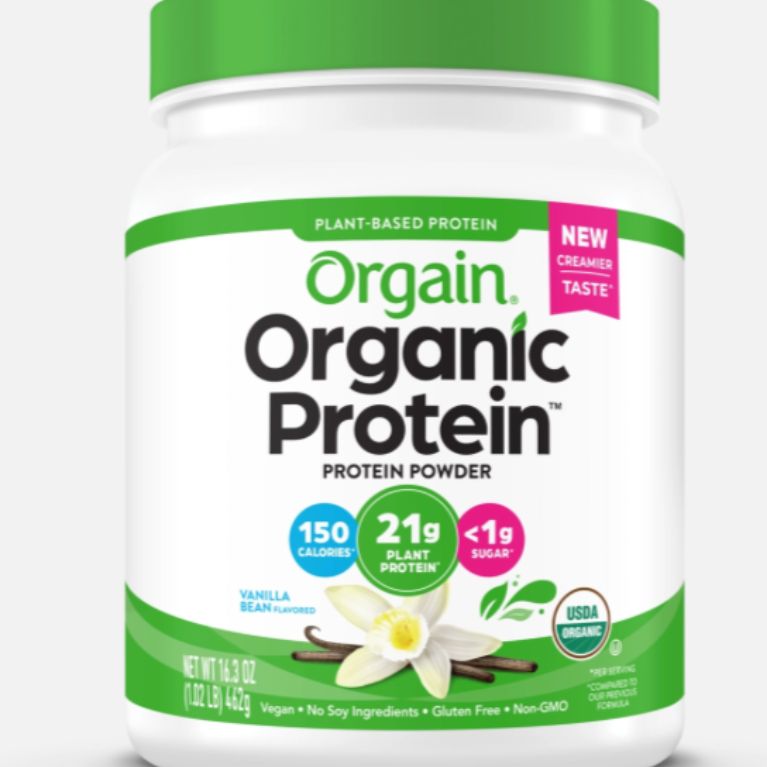
|
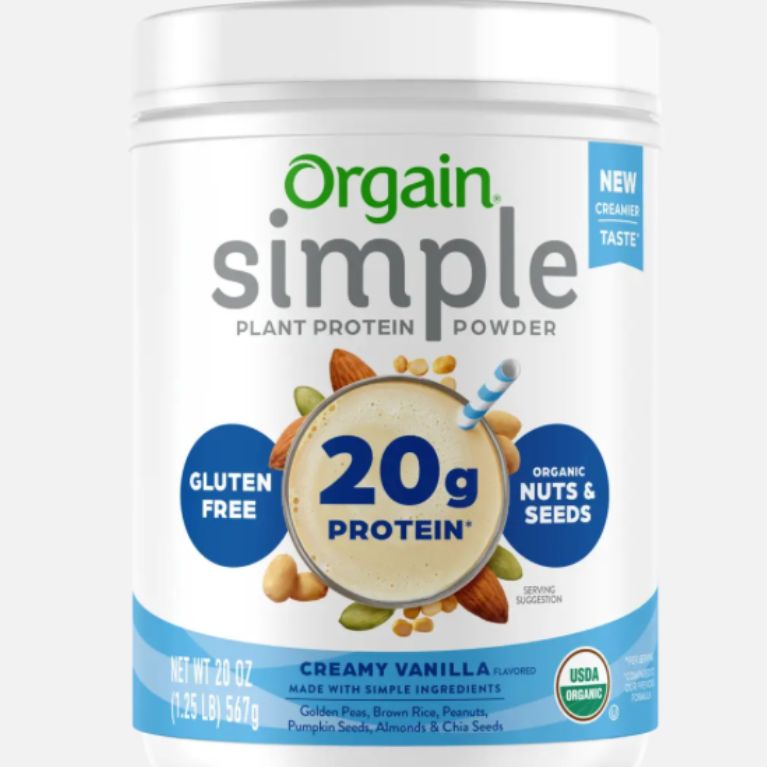
|
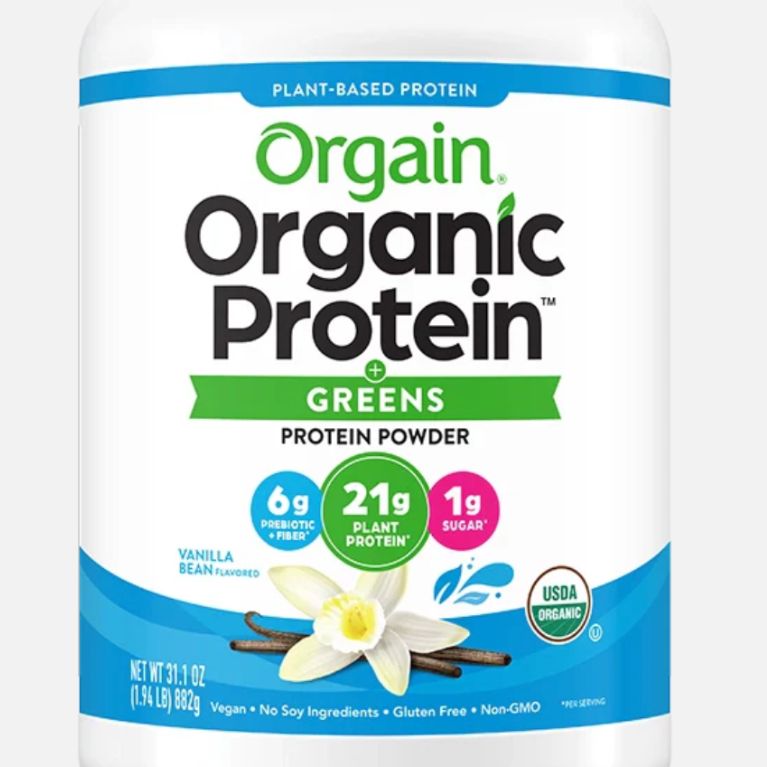
|
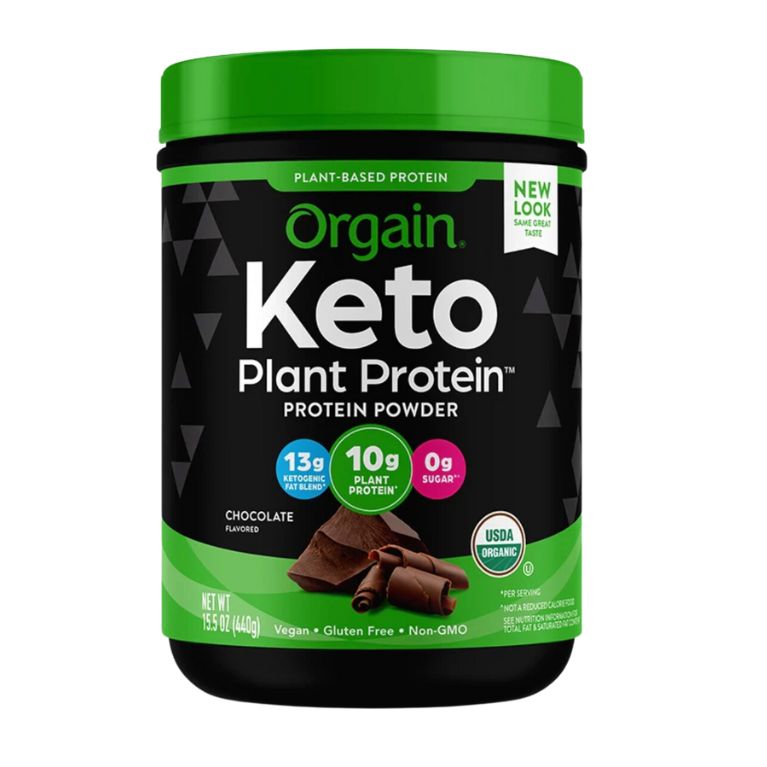
|
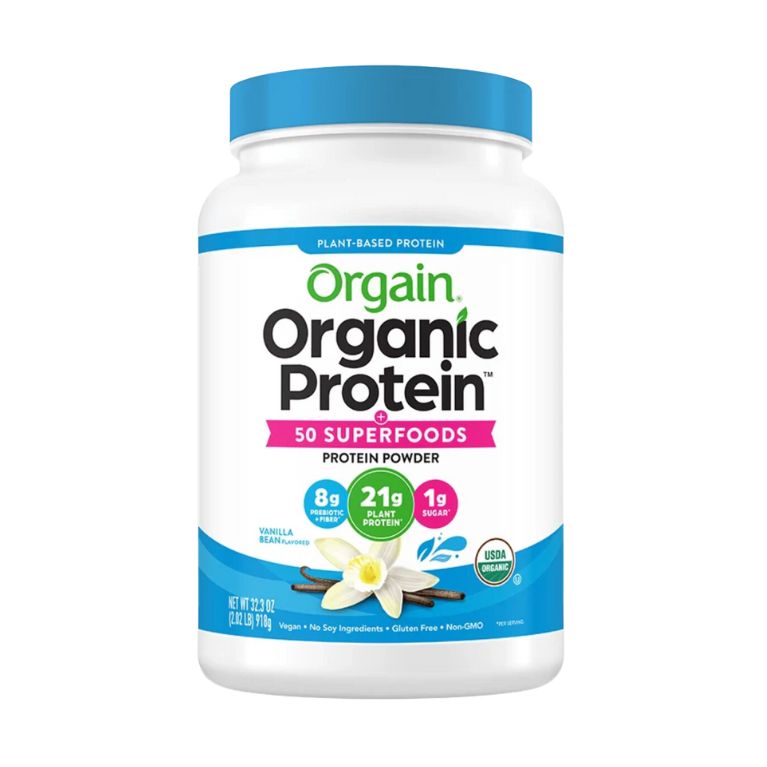
|
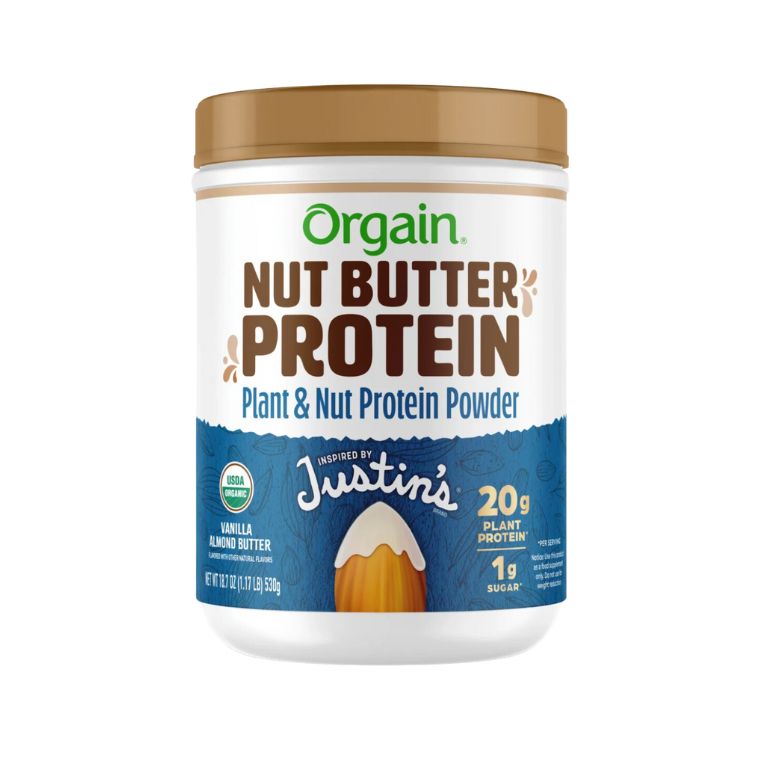
|
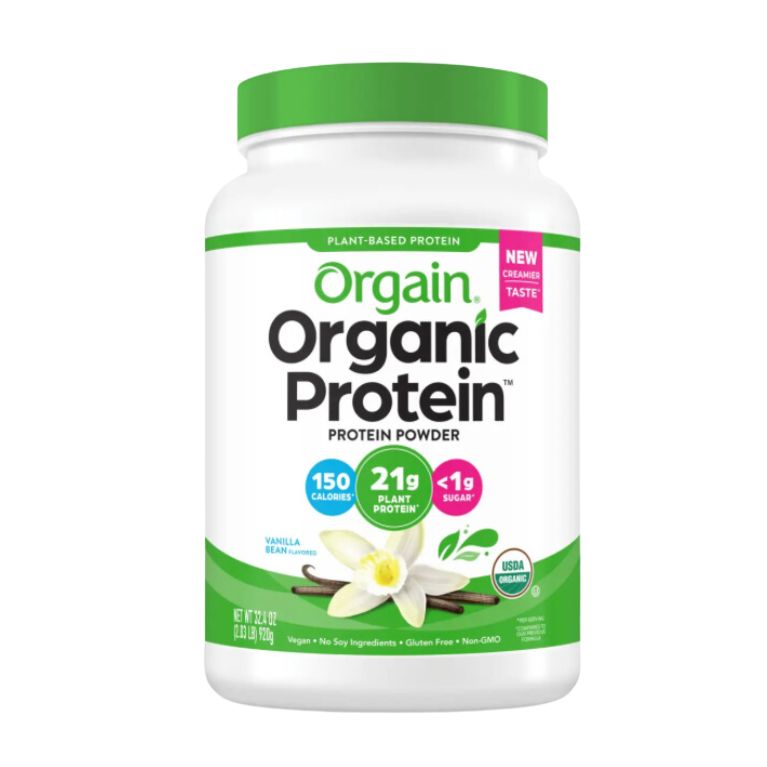
|
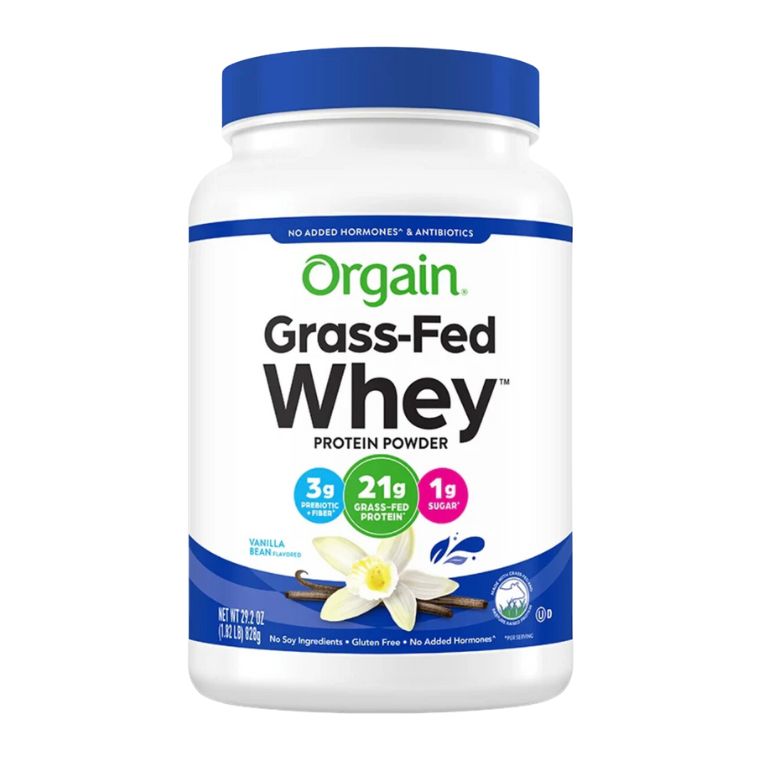
|
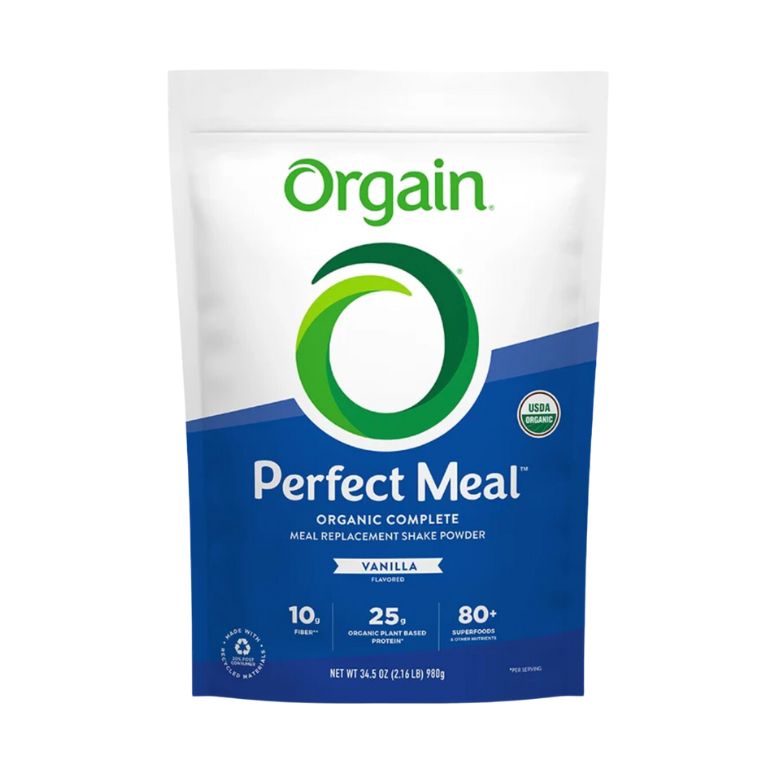
|
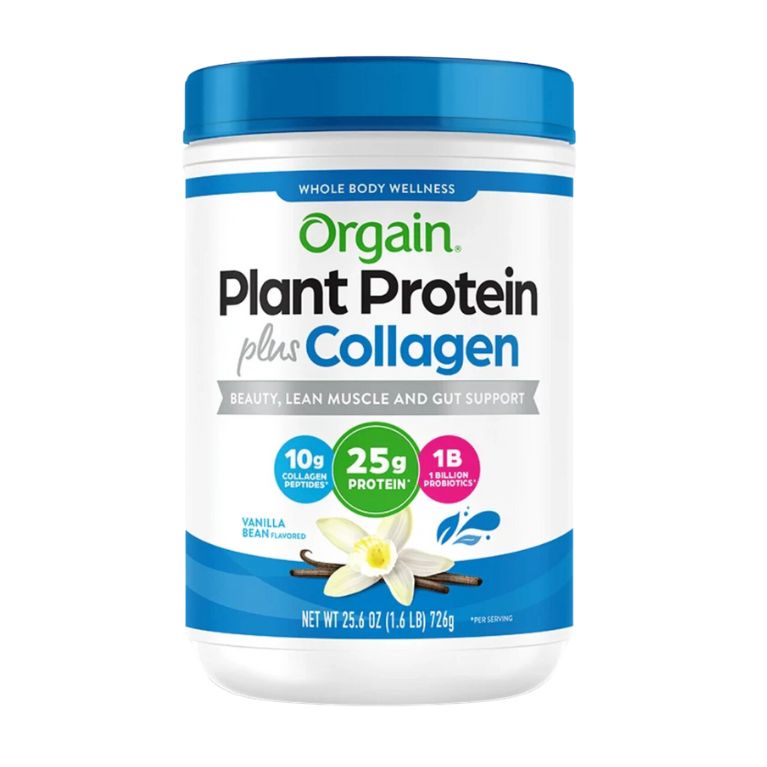
|
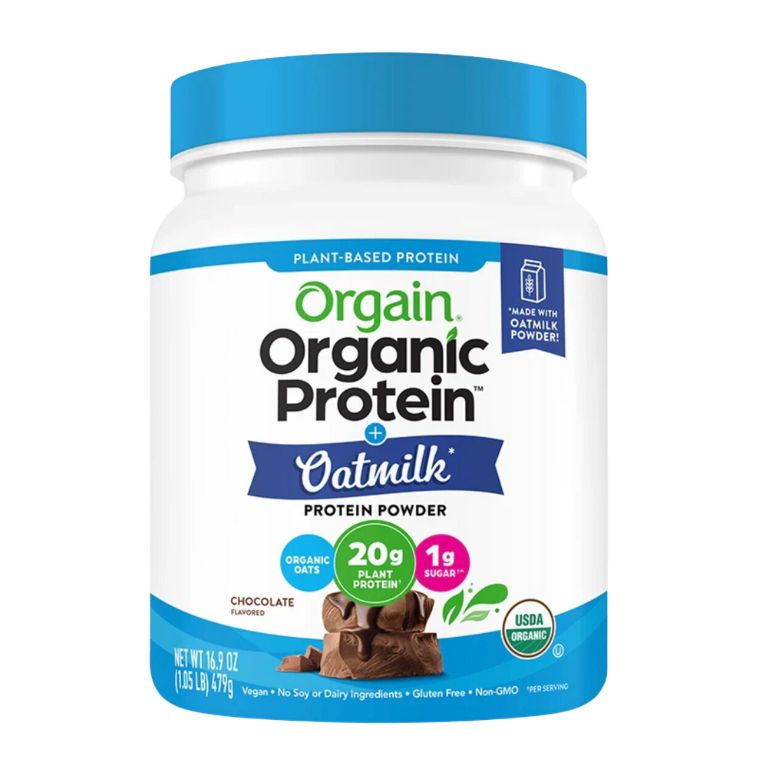
|
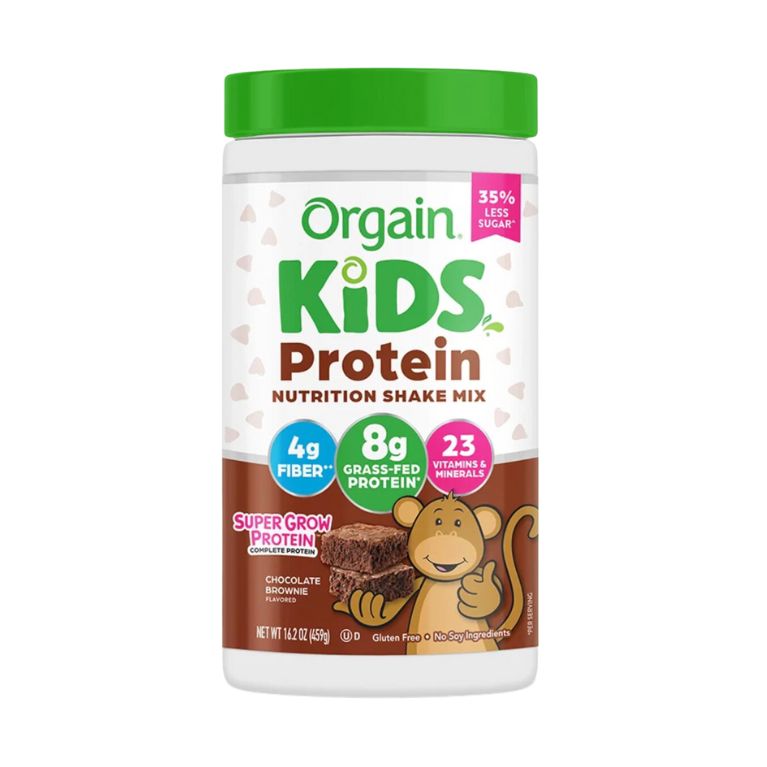
|
|
| Orgain Organic Protein Plant-Based Protein Powder | Orgain Simple Organic Plant-Based Protein Powder | Orgain Organic Protein and Greens | Orgain Keto Plant Protein | Orgain Organic Protein and Superfoods | Orgain Nut Butter Protein Powder | Orgain Sport Protein Organic Plant-Based Protein Powder | Orgain Grass-Fed Whey Protein Powder | Orgain Perfect Meal Powder | Orgain Plant Protein Plus Collagen | Orgain Organic Protein and Oatmilk | Orgain Kids Protein Nutrition Shake Mix | |
| Rating | ||||||||||||
| Price per serving | $1.90 – $3.50 | $2.53-2.71 | $2.11 | $4.50 | $2.50-3.30 | $2.86 | $2.94 | $2 | $4.79 | $3.33 | $2.67 | $2.50 |
| Protein type | Organic pea, organic brown rice, organic chia seed, mung bean | Organic pea, peanut flour, pumpkin seed, almond, chia | Organic pea, brown rice, chia seed | Organic pea | Organic pea, brown rice, chia seed | Organic pea, roasted peanut flour, brown rice, almond | Organic pea, brown rice, mung bean, chia seed | Whey concentrate | Organic pea, brown rice, chia seed | Pea protein | Organic pea, hydrolyzed oat powder, brown rice, chia seed | Whey concentrate, whole milk powder, milk protein concentrate |
| Protein per serving | 21 grams | 20 grams | 21 grams | 10 grams | 21 grams | 20 grams | 30 grams | 21 grams | 25 grams | 25 grams | 20 grams | 8 grams |
| Calories per serving | 140-190 | 150 | 150 | 180 – 190 | 160 | 140 – 150 | 200 – 210 | 130 – 140 | 250 | 140 | 150 – 160 | 180 |
| Flavor Options | 14 | 3 | 2 | 2 | 2 | 3 | 2 | 2 | 2 | 2 | 2 | 2 |
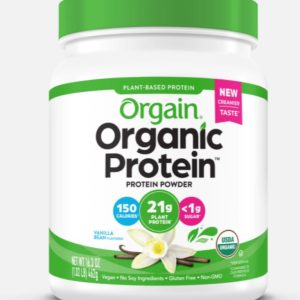

Key product features
What you should know
Orgain Protein Plant-Based Powder earned our editor’s choice because it has a lot to offer. It’s a low-fat, high-protein option with popular flavors like fruity cereal and birthday cake. Plus, it’s plant-based, and reviewers love its smooth, creamy taste.
- The plant-based formula includes all nine essential amino acids, including three branched-chain amino acids, which optimize muscle recovery. (3)
- Each serving costs between $1.90 and $3.50, depending on the canister size. For savings, opt for the 2-pound canister and subscribe to save an additional 15%.
- The chia seeds provide omega-3 fatty acids, a nutrient associated with improved heart health. (11)
- One serving equals two scoops, so be sure to keep that in mind when preparing it.
- The natural, unsweetened option contains no sugar alcohols or stevia, making it a good choice for those looking to limit certain sweeteners.
Orgain Organic Protein Plant-Based Protein Powder overview
Orgain has an extensive protein product lineup, but one of its most popular offers is its Organic Protein Plant-Based Protein powder. While many workout enthusiasts gravitate toward whey protein options due to their complete amino acid profile, this dairy-free choice provides that as well, which we’ll dive into more below. Plus, it does so while remaining free of added sugars and common allergens.
Ingredients and potential benefits
This Orgain product provides a unique blend of organic, plant-based protein sources. The combination of pea protein, brown rice protein, and chia seed ensures you’re getting a reasonable amount of amino acids, which is what protein is made up of. In fact, this formulation contains all nine essential amino acids, including three branched-chain amino acids.
The body requires essential amino acids to perform certain functions, like building muscle, but it’s not something the body can produce. As a result, we have to obtain it through our diet. (4)
Peas include 20 to 25% protein, all essential amino acids, and is free of major allergens, making it a sought-after plant-based protein source. (5) It’s particularly high in lysine and threonine but lacks cysteine and methionine. (5) Because peas are also fiber-rich, individuals may notice prolonged satiation and reduced hunger when using this protein powder. (6) This is helpful when you’re trying to lose weight.
Brown rice provides a moderate amount of protein as well, with one cup representing 5.03 grams. (7) This protein source’s essential amino acid profile includes threonine, leucine, phenylalanine, methionine, and cysteine. (8) Brown rice is also a good source of proline, a conditionally essential amino acid that plays a role in repairing muscles, skin, and connective tissue. (9)
Chia seed is another ingredient in this protein powder. It has a high concentration of protein, essential amino acids, and fiber. (10) There’s a promising amount of omega-3 fatty acids, as well. Research suggests that omega-3 supplementation may reduce the risk of heart attacks and total coronary heart disease. (11)
In addition to the Orgain Organic Protein Blend, the formulation includes an Orgain Organic Creamer Base with emulsifiers like guar gum, and xanthan gum that brands often use to help thicken the powder.
The creamer base is also made of organic acacia and rosemary extract. Acacia fiber coming from the acacia tree may cause bloating in some but is primarily associated with decreased blood glucose levels and aiding with weight control. (12) Another study shows that rosemary may have neuroprotective and anti-inflammatory properties. (13)
Macro and micronutrients
When choosing this product, remember that the nutrient profile may vary slightly by flavor. For those selecting vanilla bean, one of the more popular options, here’s what you can expect:
- Protein: 21 grams
- Carbs: 15 grams
- Fat: 3.5 grams
- Fiber: 4 grams
- Calcium: 60 milligrams
- Iron: 6.5 milligrams
- Potassium: 100 milligrams
One serving of this powder requires two scoops, equaling 21 grams of protein. This is a somewhat low amount of protein, considering the number of scoops.
However, whether or not this is enough protein to supplement your diet ultimately depends on your needs. The absence of meat, dairy, fish, and eggs in a vegan diet can make it challenging to get enough protein, especially for those trying to increase muscle mass. Therefore, a plant-based protein supplement like this one could be helpful.
At a minimum, many nutrition experts recommend that you consume at least 0.8 grams of protein per kilogram of body weight daily just to meet basic nutritional requirements. (14) If you exercise regularly, you may need more protein to support muscle growth and recovery, as well as an increase in energy expenditure. A higher daily protein intake of 1.2 to 1.6 grams is believed to sustain muscle mass and increase lean body mass. (15)
The make-up of calcium and iron in this protein powder is also a bonus, as vegans and vegetarians are often deficient in those nutrients. (16, 17)
Flavor, taste, and solubility
One of the best features of the Orgain Organic Protein Plant-Based Powder is its impressive flavor variety. While many products offer four or five options, this one has over ten. From classics like vanilla bean and creamy chocolate fudge to seasonal favorites like pumpkin spice, there’s something for everyone—including an unsweetened option for those who prefer a less indulgent shake.
I tried Orgain’s vanilla bean flavor in their Vegan Organic Nutrition Shake and enjoyed it, even more than the chocolate flavor. That said, taste is personal, and one of our testers found the vanilla bean didn’t quite taste like vanilla but rather a more generic sweetness. They preferred the chocolate flavor, noting it reminded them of hot chocolate.
“This is pretty much the only plant-based protein powder that I’ll drink with just cold water. However, I do prefer blending it with frozen bananas and almond butter.”
Team Product Tester
In terms of solubility, our testers found that it mixed better in a blender, but a shaker bottle with a mixer ball did the trick, too.
Side effects
One of our product testers uses this Orgain protein powder three to four times per week and has experienced no gastrointestinal issues. In fact, they feel it even supports their digestion.
That said, everyone’s experience can vary. This protein powder does contain sugar alcohols, like erythritol, which can sometimes cause bloating, gas, or diarrhea. However, research suggests that erythritol is generally better tolerated than other sugar alcohols, such as sorbitol. (18) “Erythritol also minimally affects blood sugar levels, unlike other sugar alcohols that might have more of an effect,” notes Victoria Burgess, PhD, CSCS, CISSN.
Cost and value
A two-pound canister of Orgain Organic Protein Plant-Based Powder is $37.99 or about $1.90 per serving and includes approximately 20 servings. When compared to all forms of protein powders, this is a somewhat pricier option, as it’s possible to find supplements that are less than $1.00 per serving. However, for a plant-based protein powder, it’s a reasonable price, especially given what it provides. It’s vegan-friendly, soy and gluten-free, Certified USDA Organic, and boasts a complete amino acid profile.
Those trying to find ways to save should consider subscribing, as that provides 15% off. With a subscription, products will auto-ship on either a 30-, 45-, 60-or 90-day basis. In addition, shipping is free with a subscription. If you opt to purchase this product as needed, shipping is $9.95 per order if the total is under $75 and shipped to the 48 contiguous states.
Third-party testing
According to Orgain, they internally test for heavy metals like arsenic, cadmium, mercury, and lead. They use current scientific research data and their internal screening assessment, which suggests that heavy metal exposure from their product intake doesn’t pose any risk to human health.
However, at this time, their test reports are confidential information and cannot be released.
It’s worth noting that Orgain products aren’t currently third-party tested. Though, they meet all applicable federal and state food regulations. Their products are also labeled according to the Federal Food, Drug, and Cosmetic Act (FD&C Act) and the Fair Packaging and Labeling Act (FPLA). Lastly, they’re manufactured according to the current U.S. Good Manufacturing Practices (GMP).
What customers are saying
The Orgain Organic Protein Plant-Based Powder reviews on Amazon are mostly positive. There are over 68,000 ratings, with an average rating of 4.4 out of 5. Protein content, blend quality, and taste are the reasons behind these high ratings.
Verified reviewer Flipflops808 writes, “I’ve been using Orgain Organic Vegan Protein Powder for a while now, and it’s hands down the best plant-based protein powder I’ve tried! It blends so smoothly into my daily smoothies without any gritty texture. The vanilla taste is fantastic—not too sweet or overpowering, and it complements fruits and greens perfectly. I love that it’s made with clean, organic ingredients. Plus, it’s packed with 21 grams of protein per serving, making it a great addition to my post-workout routine.”
“Loving this protein powder. Good flavor—just the right amount of sweetness. It mixes well in my smoothies. It keeps me satisfied without making me feel heavy or bloated.”
Pachi, Amazon
However, some customers were disappointed with the taste, solubility, and side effects.
Tbone, another customer, says, “One scoop in my coffee dissolved fine but created a grainy texture, and the sweetener had an artificial saccharine-like flavor that left an aftertaste.” Another reviewer, Andrea Giordano, said that after taking it, “I get bloated gases and sluggish.”
Specs
| Price Per Serving | $1.90 – $3.50 |
| Serving Size | 2 scoops or 1 single-serve packet |
| Protein Type(s) | Organic pea, organic brown rice, organic chia seed, mung bean |
| Calories Per Serving | 140 – 190 (depends on flavor) |
| Fat Per Serving | 3.5-5 grams |
| Carbohydrates Per Serving | 7-16 grams |
| Sweeteners | Stevia, erythritol |
| Flavors | Natural unsweetened, vanilla bean, birthday cake, chocolate caramel sea salt, chocolate peanut butter, churro caramel swirl, cookies ‘n cream, creamy chocolate fudge, fruity cereal, horchata, iced coffee, peanut butter, pumpkin spice, strawberries & cream |
More protein products from Orgain
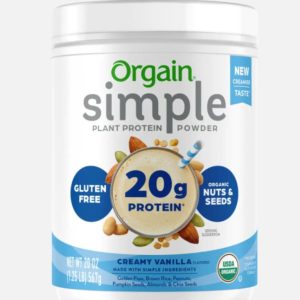

Key product features
What you should know
Orgain Simple sources its protein from organic peas, peanut flour, pumpkin seeds, almonds, and chia. It’s available in three flavors and is free of soy, dairy, GMOs, gluten, and lactose ingredients.
- Orgain Simple includes all nine essential amino acids, supporting muscle gain and weight loss.
- This supplement contains 9 to 13 grams of carbs per serving, depending on the flavor. There’s also 5 grams of coconut sugar per serving, which isn’t substantial but may not be ideal for those trying to avoid added sugars.
- At $2.53-2.71 per serving, it’s pricier than many other plant-based protein powders, but you can subscribe and save 15%. However, there are only 14-15 servings per container.
- Orgain Simple mixes well in almond milk and water, but it does settle if you don’t drink it right away.
The Simple Organic Protein Powder is an optimal choice for those looking for a plant-based protein supplement with a short ingredient list. Besides its protein blend, the ingredient list is short: organic coconut sugar, natural flavors, and sea salt.
Our team finds this protein blend impressive, as it includes five different sources. Although it’s common to see peas, almonds, and even chia seeds included as protein sources, peanut flour and pumpkin seeds are more rare. Nonetheless, both are rich sources of nutritionally well-balanced proteins. (19)
Combined, the Simple Organic Protein Powder delivers 20 grams of protein per serving, which meets 29% of the daily value (DV). Plus, it does so while remaining low-fat and providing a decent amount of iron (25-35% of the daily value).
This protein powder comes in three flavors: peanut butter, creamy chocolate, and vanilla. The creamy chocolate flavor has 8.5 milligrams of caffeine per serving from organic cocoa. This is considered a minimal amount of caffeine, though, especially compared to a beverage like brewed black tea, which has 47 milligrams.
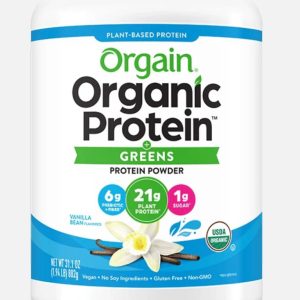

Key product features
What you should know
Organic Protein and Greens is a high-protein product with a few immune-supporting vitamins and minerals.
- Organic Protein and Greens, thanks to the addition of kale and spinach leaves, include adequate amounts of iron and vitamin K. Both micronutrients play a role in muscle function and athletic performance. (20, 21)
- This is a reasonable price at $2.11 per serving compared to most others on this list, especially considering the value it offers in protein content, micronutrients, and Certified Organic ingredients.
- This supplement is best for individuals desiring a protein powder that offers additional added vitamins and minerals.
The Orgain Organic Protein and Greens supplement is ideal for someone looking for a protein powder that offers more than just protein. In addition to providing 21 grams per serving of protein, it also yields 25% of the daily value for vitamins K and C. While vitamin C is known for aiding with immune health, it’s also a cofactor for collagen biosynthesis and helps with iron absorption. (22)
One serving provides 35% of the daily value for iron, so it’s a powerful protein powder (thanks to spinach and kale) for anyone who exercises frequently.
This protein is low in fat and contains minimal added sugar (the vanilla flavor has 1 gram, while the chocolate has zero). However, it does have erythritol, a sugar alcohol that some people are sensitive to. Every serving also contains 300-310 milligrams of sodium, so it doesn’t fall into the “low sodium” category. (43) Users should just be cautious if they’re working this into their current diet.
Besides that, it’s one of the most affordable on this list, at just $2.11 per serving. You’ll find it in two flavors: vanilla and chocolate fudge.
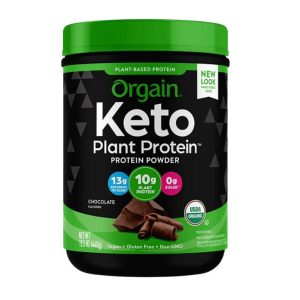
Key product features
What you should know
Orgain Keto Plant Protein is a non-GMO, vegan-friendly option that’s free from soy, dairy, gluten, and sugar. It comes in two flavors—chocolate and vanilla—and is sweetened with stevia.
- While it’s designed to have a keto-friendly fat-to-protein ratio, Orgain’s Keto Plant Protein still contains 16 grams of carbs. Those trying to stay under 20 to 50 grams of carbs per day may find it difficult with this protein powder.
- At $4.50 per serving, this Orgain product is considered pricy, and the cost isn’t easily justified.
- Keto Plant Protein includes healthy fats, like avocado oil, that have anti-inflammatory effects and cardiovascular benefits. (23)
- This option is best for individuals following a vegan or vegetarian ketogenic diet.
The Orgain Keto Plant Protein is an option for individuals seeking a supplement that aligns with the ketogenic diet. The main goal of a keto diet is to decrease overall body fat and boost metabolic health, which may be achieved by decreasing carb consumption and increasing fat and protein intake. Ultimately, the body ends up using fat as its primary fuel source instead of carbs, which decreases additional fat stores. (24)
This supplement supplies 10 grams of protein per serving, sourced from peas. It also contains 13-14 grams of fat per serving, more than some others on this list. However, this is expected as the aim is to increase fat consumption with the keto diet.
The 16 grams of carbs in each serving might not align well with this diet, though. While it could work, individuals must pay close attention to their overall carb intake if they want to maintain ketosis.
At $4.50 per serving, this plant-based protein powder is one of the most expensive on our list. Although it uses fats with anti-inflammatory benefits and uses a hypoallergenic protein source, the price isn’t easily justified.
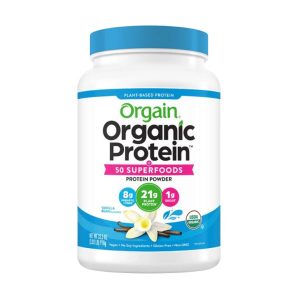
Key product features
What you should know
Organic Protein and Superfoods is formulated with 3 plant-based protein sources and a variety of fruits, veggies, grains, and more. Plus, it’s got 8-10 grams of prebiotic fiber that may help with appetite control. (6)
- Each serving of Orgain Protein and Superfoods delivers 21 grams of protein, just 5 grams of fat, 30% of the daily value for thiamin, and 30-35% of the DV for iron (depending on flavor).
- At $2.50 to $3.30 per serving, this plant-based protein powder isn’t cheap but still provides a lot of value compared to other options. If you subscribe, you’ll save 15%, which is about $2.13 – $2.81 per serving.
- This is a good choice for anyone looking for a protein supplement that’ll help them fill nutritional gaps.
- The creamer base includes acacia, a fiber that may improve digestive health and aid with hunger and weight management. (12)
The Organic Protein and Superfoods supplement includes an ingredient list full of nutritious additions. This product really stands out with its 50 superfoods blend, making it a good choice for individuals trying to fill some nutritional gaps.
Some ingredients, like quinoa, have an adequate amount of essential fatty acids, minerals, vitamins, and dietary fibers. (25) In each serving, there are 8-10 grams of fiber and 5-6.6 milligrams of iron, which provide 30-35% of the DV.
There are also wild blueberries, which may lower the risk of future heart disease in older adults, according to some research. (26) Blueberries are rich in polyphenols and contain thiamine, a vitamin we need for proper cell function. (27) “Thiamine also helps the body convert carbs into energy more efficiently,” adds Burgess.
While that’s just a glimpse into this supplement’s beneficial elements, there are things consumers have to watch, too. For instance, there are 300-320 milligrams of sodium in each serving, so it’s not considered a low-sodium item, for those who might be looking for that. (43)
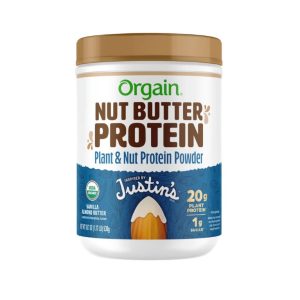

Key product features
What you should know
Orgain’s Nut Butter Protein Powder has four protein sources: pea, roasted peanut flour, brown rice, and almond. It’s also free of artificial sweeteners, flavors, and preservatives.
- Nut Butter Protein only has two to three grams of fat, making it a decent, low-fat option.
- At $2.86 per serving and only 14 servings per package, this doesn’t seem very value-for-money when compared to other options.
- Individuals who want a high-protein powder with a good taste, as it’s infused with Justin nut butter flavors.
- This product comes in three flavors catering to those with a sweet tooth: vanilla almond butter, dark chocolate peanut butter, and peanut butter.
Orgain Nut Butter Protein Powder is similar to our editor’s choice, offering a comparable protein content (20 grams vs. 21 grams per serving), the same calorie count (140-150 per serving), and a low-fat profile.
The main difference, however, lies in flavor. Orgain’s Nut Butter Protein Powder takes inspiration from Justin’s nut butter products, making it a great option for peanut butter lovers, especially those who are fans of the Justin’s brand. This plant-and-nut protein powder is available in three flavors and costs $2.86 per serving. The dark chocolate peanut butter flavor, for instance, channels the taste of Justin’s dark chocolate peanut butter cups—a delicious treat.
However, it seems the higher price is largely due to its unique flavors, as it doesn’t offer significantly more value than our more affordable editor’s choice.
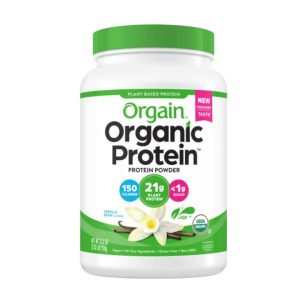

Key product features
What you should know
Sport Protein provides 30 grams of protein per serving that’s derived from four sources: peas, brown rice, mung bean, and chia seed. This gluten and dairy-free option promotes muscle protein synthesis while remaining low-fat.
- The 9 grams of essential amino acids and 4 grams of branch chain amino acids may aid muscle building and recovery. (3)
- Sport Protein includes ingredients like tart cherry, turmeric, and ginger, all associated with improved overall health.
- One 2-pound container only includes 16 servings priced at $2.94 each. Although pricey, it may bring peace of mind to individuals wanting a clean, high-protein, nutritious powder.
- Those watching their sodium intake should keep in mind that each serving has 390-400 milligrams of sodium, which is a lot for a protein powder.
The Sport Protein is designed for frequent exercisers or athletes who would benefit from certain ingredients that aid muscle growth and recovery. We’re pleased with its 30 grams of protein per serving. With protein being the building block for all tissues, athletes require more of it to rebuild and repair skeletal muscle following intense training. (28)
This protein powder has more calories, too, which is helpful as active people need more calories than those who are sedentary. Yet, it remains low-fat and provides a decent amount of fiber and iron.
This supplement also has ingredients like mung bean, a fruit and vegetable blend, and more. Mung bean, for example, is a functional food in promoting health and wellness. (29) “It has also been found to help beneficial gut bacteria thrive,” Burgess noted. Ingredients like ginger and tart cherry have anti-inflammatory properties that are helpful for overall health as well. (30, 31)
At $2.94 per serving, Sport Protein is more expensive than other options on our list, but we believe it may be worth the price for people who are prioritizing exercise and healthy recovery.
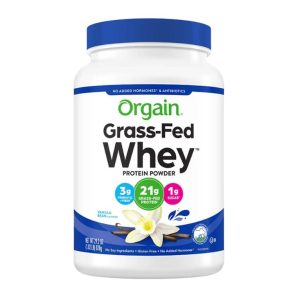

Key product features
What you should know
Grass Fed Whey Protein is a lower-calorie supplement free of gluten, artificial sweeteners, preservatives, and added hormones.
- Whey protein is rich in the branched-chain amino acid, leucine. Leucine provides energy for protein synthesis while preventing protein degradation. (32) “Although not stated on the label, the ideal amount of leucine for optimal muscle protein synthesis is at least 2.2 grams,” adds Burgess.
- At $2 per serving, this is one of the most affordable protein powders on this list. The almost 2-pound container includes approximately 20 servings.
- This is best suited for those who prefer a low-fat, low-calorie protein powder that’s made from whey concentrate.
- Grass Fed Whey provides 21 grams of protein, 5 grams of BCAA’s, and only 130 to 140 calories per serving. It includes 120-130 milligrams of calcium and 2.1 milligrams of iron.
Most of Orgain’s products are plant-based, but if you’re open to a non-vegan option, they offer a Grass-Fed Whey Protein Powder as well. At just $2 per serving, it’s one of the most affordable choices on this list.
This supplement is made using whey concentrate, meaning it has undergone a less intense filtration process than whey protein isolate. Whey concentrate is known for having a higher fat and carb content but less protein than whey isolate. Orgain’s Grass Fed Whey protein powder, in particular, is still relatively low in fat and carbs, being just 3 and 11-12 grams per serving.
Whey concentrate also has more calories, although this product is still one of the lowest on this list, at just 130 or 140 calories per serving, depending on the flavor you choose. Ultimately, their amino acid profiles are very similar since they are derived from the same proteins.
This low-fat, lower-calorie supplement delivers 21 grams of protein and 1-2 grams of fiber per serving. It also provides 5 grams of BCAAs, including leucine, which supports energy and protein synthesis. (32)
Sodium watchers will appreciate that this powder has less sodium than the others. It does not have added sugar, either, but it is sweetened with erythritol and stevia.
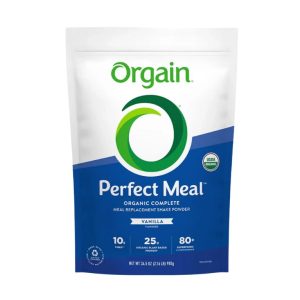

Key product features
What you should know
Perfect Meal Powder has a protein blend that includes peas, brown rice, and chia seeds, contributing to the 25 grams of protein and 10 grams of fiber in each serving. The two-pound container comes in just two flavors: chocolate and vanilla.
- Each serving contains 40% or more of the daily value of micronutrients like vitamins A, B3, B7, B12, and C.
- Perfect Meal Powder contains adaptogens, like ginseng and ashwagandha, that reduce stress and improve sleep. (33, 34)
- This is best suited for individuals looking for a convenient protein shake that can act as a healthy snack alternative.
- At $4.79 per serving, this is pricier than similar meal replacement shakes and protein bars.
- Perfect Meal Powder includes monk fruit extract, a very sweet natural sweetener shown to have anti-inflammatory, and antioxidant properties. (35)
The Perfect Meal Powder from Orgain can be beneficial whether you’re aiming to lose or gain weight. For those focused on weight loss, it works as a nutritious meal replacement at only 250 calories—lower than many snacks—and contains 10 grams of fiber to help curb hunger, keep blood sugar more stable and help with regular digestion. (6) For those looking to increase their calorie intake, it’s a better option than empty-calorie foods, providing more nutritional value. For example, this powder includes a host of vitamins, like vitamins A, B12, D, E, and some minerals, like calcium and copper.
Compared to our editor’s pick, the Perfect Meal Powder offers slightly higher fat and protein levels, with 7-8 grams and 25 grams per serving, respectively. It also boasts an impressive micronutrient profile, making it ideal for filling potential nutritional gaps. Key nutrients like zinc, iodine, folate, and magnesium each provide 10% or more of the daily value. The formula even includes adaptogens like ginseng, known to support reduced anxiety, increase immunity, decrease inflammation and improved sleep quality. (34)
However, its higher sodium content and price—nearly $5 per serving—may be a drawback for some.
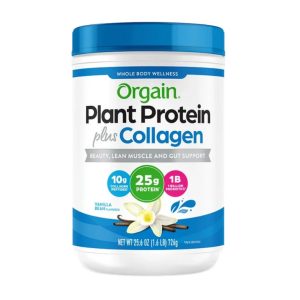

Key product features
What you should know
Plant Protein Plus Collagen consists of 15 grams of pea protein and 10 grams of grass-fed collagen per serving. This low-fat supplement includes zero sugars and is free of artificial flavors, soy, and preservatives.
- The inclusion of collagen peptides may help enhance muscle strength, decrease fat mass, and increase fat-free mass when combined with resistance training. (36)
- Plant Protein Plus Collagen contains 1 billion probiotics, which may boost immunity, improve gastrointestinal ailments, and improve overall health. (37)
- This is a solid choice for someone who likes plant-based protein, but also wants the benefits associated with collagen and probiotics.
- At $3.33 per serving, this protein powder is pricier than some others but a good choice for those who prioritize clean ingredients.
- The solubility of this supplement is great, making it easy to mix in with breakfast foods like oatmeal and yogurt.
The Plant Protein Plus Collagen supplement is a convenient choice for someone who wants the best of both protein worlds. There are 15 grams of pea protein, which already provides all essential amino acids while remaining free of major allergens. (5) Then, there are 10 grams of collagen peptides, which are shown to potentially improve muscle strength and skin elasticity. (38, 39)
This low-fat, low-calorie protein supplement is a good source of fiber and also meets 10% or more of the daily value for iron and calcium. It also contains 1 billion probiotics that may support gut health and boost overall health. (37)
Plant Protein Plus Collagen comes in vanilla and chocolate flavors and costs $3.33 per serving. This is pricier than other options from Orgain.
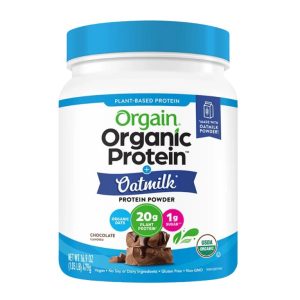

Key product features
What you should know
Organic Protein + Oatmilk comes in two flavors and offers four protein sources: oat powder, pea, brown rice, and chia seed. Monk fruit and stevia help sweeten the deal.
- Oat milk is abundant with beta-glucan, a water-soluble dietary fiber that helps lower blood sugar, cholesterol, and blood lipids by delaying gastric emptying. (40)
- The 1-pound canister only contains 12 servings priced at $2.67 each. While a little expensive for a protein powder, it’s flavorful and offers clean nutrition.
- One serving of Organic Protein + Oatmilk contains 1190 milligrams of phenylalanine per serving, an essential amino acid that may stimulate the breakdown of fat. (41)
- A great choice for anyone who likes the regular Orgain Plant-Based protein powder, but would prefer it with an oat milk/milk-like flavor.
The Organic Protein and Oatmilk powder is similar to the editor’s choice. Both are low-fat and include 20-21 grams of protein with every serving. Depending on the flavor, they even offer the same amount of calories (150 per serving). Each has four protein types and shares three of the same protein sources—peas, chia seeds, and brown rice. The Organic Protein and Oatmilk supplement uses only oat powder instead of mung bean.
Those trying to choose between this and the editor’s choice could do so based on flavor.
Oat milk has a milk-like flavor, appealing to people who prefer plant-based powders but enjoy that distinct flavor. However, the Organic Protein and Oatmilk only has two flavors—vanilla and chocolate—which might be limiting, especially when the Organic Protein™ Plant-Based Protein Powder has 10+ flavor choices.
Their differences in sodium content, fiber, and price can also help with making a selection. Organic Protein and Oatmilk powder has less sodium but is slightly higher priced, at $2.67 per serving. It also has 2 grams less fiber than our editor’s choice.
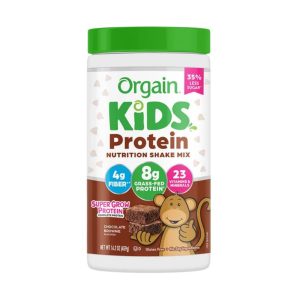

Key product features
What you should know
The Orgain Kids Protein Nutrition Shake is designed to help little ones get the essential vitamins and minerals they need for proper development. This nutrient-rich, gluten-free powder provides 8 grams of grass-fed whey protein concentrate with every serving.
- The Kids Protein Nutrition Shake meets 30% of the daily value for vitamin D, biotin, vitamin C, vitamin B12, and chromium, aiding overall health.
- At $2.50 per serving, this supplement is a cost-effective, nutritious snack with a good taste.
- This is ideal for parents looking for a nutritive snack choice for their kiddos.
- The lack of third-party testing may concern some, but the absence of artificial flavors and preservatives may make it worth the investment.
Many popular snacks on the market today are filled with unhealthy ingredients and offer little to no nutritional value. For parents seeking a healthier choice for their kids, the Kids Protein Nutrition Shake Mix is a great option. Each serving provides eight grams of protein from whey, whole milk powder, and milk protein concentrate.
The shake also includes an organic fruit and vegetable blend—with apple fiber, beets, spinach, bananas, and more—that boosts its micronutrient profile. Key nutrients like vitamin D, phosphorus, copper, calcium, and niacin contribute 10% or more of the daily value per serving.
While it does contain seven grams of sugar per serving, that’s still significantly less than what’s typically found in many snack options. At $2.50 per serving, it’s not the most affordable option on the market, but well worth it for parents looking to invest in a healthier alternative for their kids.
Orgain Organic Protein Plant-Based Protein Powder vs. competitors

|
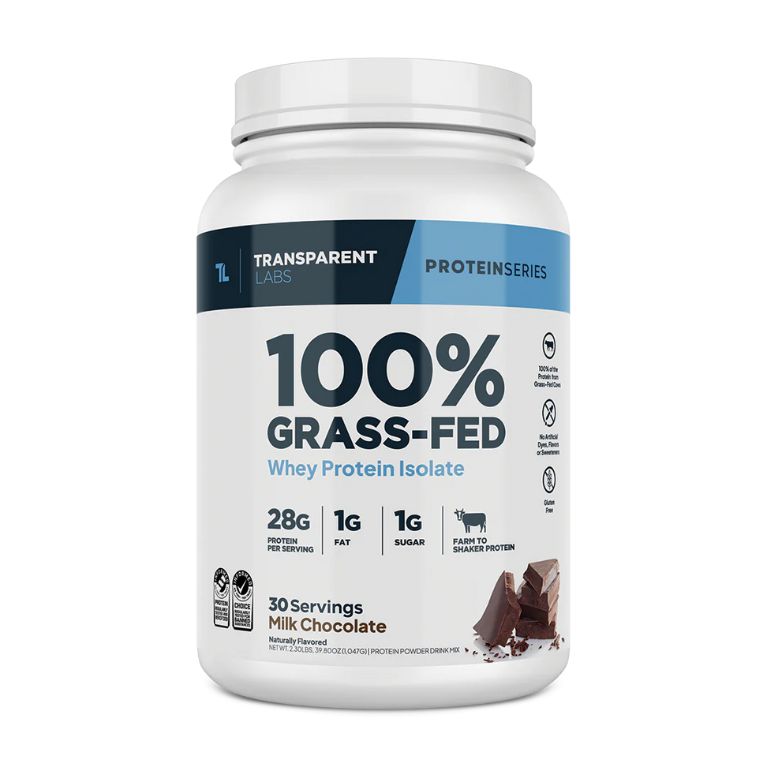
|
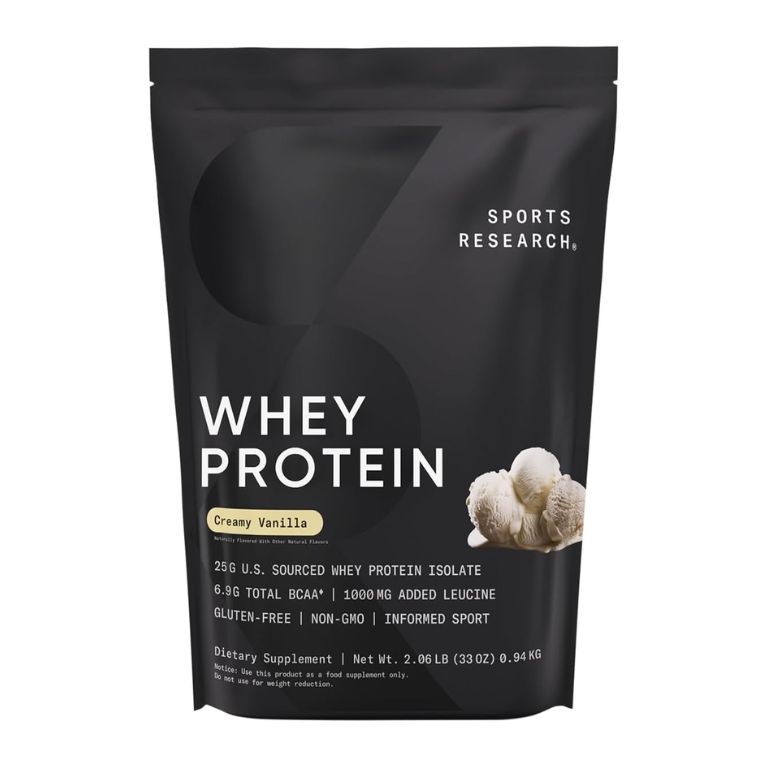
|
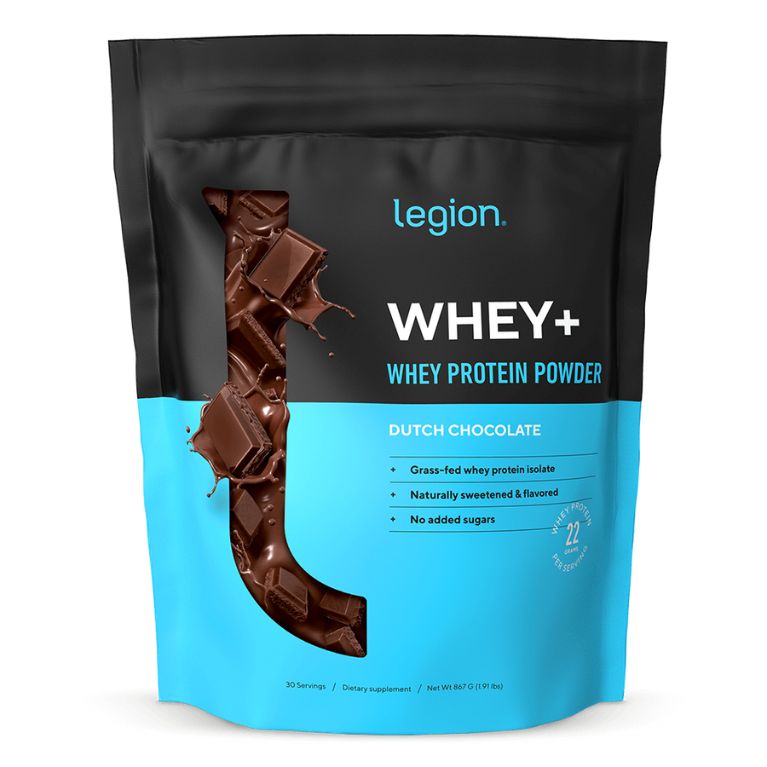
|
|
| Orgain Grass Fed Whey Protein Powder | Transparent Labs 100% Grass-Fed Whey Protein Isolate | Sports Research Whey Protein Isolate | Legion Athletics Whey+ | |
| Rating | ||||
| Price per serving | $2 | $2 | $1.46 | $2 |
| Protein type | Whey concentrate | Whey protein isolate | Whey protein isolate | Whey protein isolate |
| Protein per serving | 21 grams | 28 grams | 25 grams | 21-23 grams |
| Calories per serving | 130–140 | 130-150 | 140-150 | 100-130 |
| Flavors | 2 | 13 | 2 | 20 |
Not everyone loves vegan protein powders, but there are plenty of high-quality whey options available. For example, Transparent Labs 100% Grass-Fed Whey Protein offers 28 grams of protein per serving with clean, natural ingredients, each batch third-party tested for purity and potency. This whey protein is perfect for those seeking a clean, gluten-free, low-carb, and low-fat option with a variety of flavors. However, it’s pricier, contains no fiber, and offers minimal iron.
For those wanting fewer calories and more flavor choices, Legion Athletics Whey+ could be a fit. It has slightly more protein per serving than Orgain but lacks fiber and iron.
Sports Research Whey Protein Isolate provides a similar calorie count to Orgain, yet packs more protein and is the most affordable option—great for budget-conscious buyers. Plus, it’s an excellent pick for boosting vitamin D intake, covering 100% of the daily value.
How we test plant-based protein supplements
As interest grows, we’ll witness more and more plant-based proteins entering the marketplace. However, it’s important to recognize that not all products are created equally. Therefore, we developed a custom testing methodology and scoring algorithm to assess which ones stand out the most.
We rate each plant-based protein supplement across six main categories. Each category possesses a different percentage weight of the total score based on its relative importance when deciding whether or not to buy. Bonus credits can also be earned if a plant-based product is third-party tested, contains digestive enzymes, possesses certifications, and more. These categories were developed in collaboration with registered dietitian and doctor of exercise physiology, Chris Mohr.
You can review our full plant-based protein testing methodology here.
Protein source–40%
Not all plant protein sources are created equal. For instance, some of them provide more protein than others or are missing essential amino acids. Plant sources, in particular, often lack one or more amino acids, which is why some protein supplements contain multiple sources.
The source also dictates the calories from protein in comparison to carbohydrates or fats.
We review eight plant protein sources, which include:
- Soy
- Pea
- Hemp
- Brown rice
- Lentil
- Chia
- Pumpkin seed
- Protein blends
Complete protein–20%
Not all plant sources provide a complete amino acid profile, which is one where it contains all nine essential amino acids: histidine, isoleucine, leucine, lysine, methionine, phenylalanine, threonine, tryptophan, and valine. Some play a big role in muscle growth and energy production, while others aid with appetite regulation and sleep. Because of their benefits, protein supplements that contain complete proteins receive the highest mark.
Incomplete proteins, on the other hand, contain some essential amino acids but not all. Being incomplete doesn’t make them bad, per se, but it does mean you’ll want to ensure that you’re getting those essential amino acids from another source.
Macronutrient calories per serving–15%
The make-up of macronutrients per serving can play a role in one’s energy levels, performance, muscle recovery, and overall well-being. Preferably, most of the calories consumed through plant protein powder should be derived from protein.
However, calories can also come from fats and carbohydrates depending on the protein source and other ingredients. Excessive fat and carb content can lead to unintentional weight gain if not accounted for. We examine the calories in each product to decipher if it aligns with certain dietary goals, like a low-carb diet, for example.
Our factors in this rating include:
- Calories from protein
- Calories from carbs
- Calories from fats
Total protein per serving–15%
Based on research, it’s recommended that individuals try to consume approximately 25-30 grams of protein with every serving. However, this amount may vary based on an individual’s age, goals, training, and more.
We use protein per serving to determine how effective the supplement is in meeting daily protein needs.
Our factors in this rating include:
- 20 grams of protein or less per serving
- 21 to 30 grams of protein per serving
- Over 30 grams of protein per serving
Price per gram of protein–5%
Understanding the cost efficiency is important for those who want to manage their budget while meeting their nutritional needs. We consider the price per gram of protein to compare the value of different products.
These are the ranges we consider:
- $0.30 to $0.50 per gram
- $0.60 to $0.80 per gram
- $0.90+ per gram
Sweeteners–5%
Sweeteners influence a plant-based protein powder’s taste, caloric content, and health impact. We evaluate the type and amount of sweeteners used to determine their impact on flavor,
suitability for low-sugar diets, and any potential health implications. Ultimately, we prefer to see fewer sweeteners in protein formulas and prefer some over others.
Here are the common ones we evaluate:
- Sugar
- Dextrose
- Honey, agave
- Stevia
- Maltodextrin
- Erythritol
- Monk fruit
- Sucralose
- Aspartame
- Xylitol, acesulfame
Certifications
Nearly all reputable supplement companies conduct in-house testing for safety and label accuracy. However, many brands also opt for additional certifications to further ensure quality and safety. We award bonus credits to brands that undertake this extra step. Recognizing that smaller, newer supplement companies may not afford high-profile, third-party testing labs, we weigh certifications lower than other categories in our algorithm.
Bonus points
Since the supplement industry—especially protein supplements—is constantly evolving, we pay attention to products and brands going above and beyond to stand out. That’s why we incorporate bonus credits into our plant-based protein supplement scores to recognize innovation and encourage healthy competition among all brands. All bonus points are equally weighted and cumulatively provide a slight boost to the product’s overall score.
Plant protein formulas are awarded bonus credits for:
- No proprietary blends
- Sustainable packaging
- Added enzymes
How we test whey protein supplements
Our evaluation of whey protein supplements is similar to our assessment for plant-based protein supplements. It covers six primary categories: protein source, macronutrient calories per serving, protein per serving, price per gram of protein, sweeteners, and third-party testing. Bonus points are also available in this evaluation process. These categories were also developed in collaboration with Chris Mohr, PhD, RD.
Also an extension of our broader nutrition product and supplement methodology, you can read our full whey protein testing methodology here.
Protein source–50%
This makes up the bulk of our evaluation of whey protein powders, as protein source impacts digestibility, absorption, and the ratio of protein to other macronutrients. We evaluate four different whey protein sources: whey concentrate, whey isolate, whey hydrolysate, and whey blends.
Total protein per serving–20%
This aspect of our rating is based on research suggesting an optimal intake of 25–30 grams of protein per serving.
Macronutrient calories per serving–15%
The majority of calories in whey protein powders should come from protein, but calories may also come from carbohydrates and fats.
Cost per serving–5%
Price often reflects quality, but not always. We rate whey protein powders based on their price per gram of protein
Sweeteners–10%
Sweeteners may enhance a supplement’s taste, but they don’t add any nutritional value. We prefer minimal sweeteners and rate them according to their nutritional profile.
Certifications
We award additional points when a supplement has earned a certification.
Here are the certifications that stand out to us:
- Third-party testing
- Informed Choice (ICFS)
- NSF
- U.S. Pharmacopeia (USP)
- Labdoor
Bonus points
To recognize innovation and encourage healthy competition, our team incorporates bonus credits into our scores. Bonus points provide a small boost to the product’s overall score and are equally weighted.
- Enzymes for digestion
- Sustainable packaging
- 100% grass-fed whey
- Certified organic
- No proprietary blends
FAQs
Is Orgain protein powder good?
Yes, Orgain protein powder stands out with its taste, solubility, and carefully crafted formula. Most Orgain products come in multiple flavors, with some even inspired by Justin’s nut butters. Their consistent mixability and creamy texture make them ideal for adding to shakes or baked goods. In addition, our testers noted they don’t have a strong undesirable aftertaste that’s often found in other dairy-free protein powders.
Is Orgain protein powder healthy?
Orgain prioritizes high-quality ingredients, avoiding artificial flavors and preservatives, and most of their products are USDA Organic certified, GMO-free, and free of soy and gluten. All of these contribute to factors of “healthiness.” Additionally, some products even include a fruit and veggie blend plus probiotics, helping to fill nutrient gaps and support gut health.
Does Orgain have heavy metals?
Ingredients derived from plant-based or bovine-based food sources may contain trace amounts of heavy metals due to natural soil absorption. (42) Toxic levels of this substance require very large concentrations to be toxic to humans. (42) According to Orgain, their products are tested for arsenic, cadmium, mercury, and lead. Based on their assessment, heavy metal exposure in their products doesn’t pose any risk to human health.
Is Orgain protein powder a complete protein?
Yes. Orgain’s plant-based protein powders often include pea protein, which provides all nine essential amino acids. Some of their products contain protein blends with multiple protein sources, like brown rice, chia seeds, and almonds. This helps to ensure consumers get a suitable amount of each amino acid, as some protein sources lack certain ones, like lysine, threonine, cysteine, and methionine and the leucine content is often much less than a whey based protein. (5)
Is Orgain organic protein powder good for weight loss?
Orgain Organic Protein Powder can support weight loss goals. The fiber in their plant-based formula promotes satiety and improves gut health, which can aid in managing appetite. (6) Additionally, plant-based proteins often have fewer calories than whey, making them a great option for those looking to reduce calories while still getting enough protein to support muscle growth.
These statements have not been evaluated by the Food and Drug Administration. These products are not intended to diagnose, treat, cure, or prevent any diseases.
Our experts
Victoria Burgess, Ph.D., CSCS, CISSN
Victoria Burgess earned her Ph.D. in Health and Human Performance from Concordia University Chicago and holds her NSCA CSCS and Certified Sports Nutritionist (CISSN). She is an adjunct professor in the Human Performance and Nutrition department at Concordia University Chicago & Parker University, where she teaches undergraduate, graduate, and doctoral level courses.
Joana Neziri, M.S., NASM CPT
Joana is a writer, editor, and content strategist focusing on nutrition, fitness, and all things health. After earning a master’s degree in business from the University of North Florida, she began a career in research and digital marketing.
Lily Moe, Editor
Lily is a Brooklyn-based writer and editor with over seven years of experience in health media. As a former Fitness Coach, Lily’s editorial prowess has largely focused on fitness, nutrition, and weight management. She has also spent a fair share of time in testing labs, analyzing everything from protein powders to yoga mats. Her work has appeared in Verywell Fit, Verywell Mind, Health, and more.
Kelly Uhler
Kelly has a multifaceted background in elder care, health care, and copywriting. She has worked for organizations such as A Place For Mom and Homecare.com, which gave her the opportunity to work closely with families, providing reliable information to help them make informed decisions about their loved one’s health, safety, and quality of life.

Jessica Thomas, MPH, NASM-CNC
Fortune Recommends Writer
About Author
Jessica Thomas is a health and wellness writer, public health professional, and business owner. She has a Bachelor of Science in Health Administration with a focus on Aging Studies. In addition, Jessica has earned a Master of Public Health with a minor in Public Health Informatics from Michigan State University.
Jessica genuinely enjoys researching information and making it digestible to others so that they can implement evidence-based practices. In her spare time, you can catch her reading self-help and business books, trying out a new home workout, and spending time with family and friends.
References
- Pittman, R. N. (2011). Oxygen transport. Regulation of Tissue Oxygenation – NCBI Bookshelf. https://www.ncbi.nlm.nih.gov/books/NBK54103/
- Pasiakos, S. M., McLellan, T. M., & Lieberman, H. R. (2015). The effects of protein supplements on muscle mass, strength, and aerobic and anaerobic power in healthy adults: a systematic review. Sports medicine (Auckland, N.Z.), 45(1), 111–131. https://doi.org/10.1007/s40279-014-0242-2
- Ferrando, A. A., Wolfe, R. R., Hirsch, K. R., Church, D. D., Kviatkovsky, S. A., Roberts, M. D., Stout, J. R., Gonzalez, D. E., Sowinski, R. J., Kreider, R. B., Kerksick, C. M., Burd, N. A., Pasiakos, S. M., Ormsbee, M. J., Arent, S. M., Arciero, P. J., Campbell, B. I., VanDusseldorp, T. A., Jager, R., . . . Antonio, J. (2023). International Society of Sports Nutrition Position Stand: Effects of essential amino acid supplementation on exercise and performance. Journal of the International Society of Sports Nutrition, 20(1). https://doi.org/10.1080/15502783.2023.2263409
- Lopez, M. J., & Mohiuddin, S. S. (2024, April 30). Biochemistry, essential amino acids. StatPearls – NCBI Bookshelf. https://www.ncbi.nlm.nih.gov/books/NBK557845/
- Shanthakumar, P., Klepacka, J., Bains, A., Chawla, P., Dhull, S. B., & Najda, A. (2022). The current situation of pea protein and its application in the food industry. Molecules, 27(16), 5354. https://doi.org/10.3390/molecules27165354
- Akhlaghi, M. (2022). The role of dietary fibers in regulating appetite, an overview of mechanisms and weight consequences. Critical Reviews in Food Science and Nutrition, 64(10), 3139–3150. https://doi.org/10.1080/10408398.2022.2130160
- Lee, J., Sreenivasulu, N., Hamilton, R. S., & Kohli, A. (2019). Brown rice, a diet rich in health promoting properties. Journal of Nutritional Science and Vitaminology, 65(Supplement), S26–S28. https://doi.org/10.3177/jnsv.65.s26
- Jayaprakash, G., Bains, A., Chawla, P., Fogarasi, M., & Fogarasi, S. (2022). A Narrative review on rice Proteins: Current scenario and food Industrial Application. Polymers, 14(15), 3003. https://doi.org/10.3390/polym14153003
- National Center for Biotechnology Information (2024). PubChem Compound Summary for CID 145742, Proline. Retrieved November 1, 2024 from https://pubchem.ncbi.nlm.nih.gov/compound/Proline.
- Grancieri, M., Martino, H. S. D., & De Mejia, E. G. (2019). Chia Seed (Salvia hispanica L.) as a Source of Proteins and Bioactive Peptides with Health Benefits: A Review. Comprehensive Reviews in Food Science and Food Safety, 18(2), 480–499. https://doi.org/10.1111/1541-4337.12423
- Office of Dietary Supplements – Omega-3 fatty acids. (n.d.). https://ods.od.nih.gov/factsheets/Omega3FattyAcids-HealthProfessional/
- Larson, R., Nelson, C., Korczak, R., Willis, H., Erickson, J., Wang, Q., & Slavin, J. (2021). Acacia gum is well tolerated while increasing satiety and lowering peak blood glucose response in healthy human subjects. Nutrients, 13(2), 618. https://doi.org/10.3390/nu13020618
- Rahbardar, M. G., & Hosseinzadeh, H. (2020). Therapeutic effects of rosemary (Rosmarinus officinalis L.) and its active constituents on nervous system disorders. PubMed, 23(9), 1100–1112. https://doi.org/10.22038/ijbms.2020.45269.10541
- Harvard Health. (2023, June 22). How much protein do you need every day? https://www.health.harvard.edu/blog/how-much-protein-do-you-need-every-day-201506188096#:~:text=How%20much%20protein%20do%20I,meet%20your%20basic%20nutritional%20requirements.
- Nunes, E. A., Colenso‐Semple, L., McKellar, S. R., Yau, T., Ali, M. U., Fitzpatrick‐Lewis, D., Sherifali, D., Gaudichon, C., Tomé, D., Atherton, P. J., Robles, M. C., Naranjo‐Modad, S., Braun, M., Landi, F., & Phillips, S. M. (2022). Systematic review and meta‐analysis of protein intake to support muscle mass and function in healthy adults. Journal of Cachexia Sarcopenia and Muscle, 13(2), 795–810. https://doi.org/10.1002/jcsm.12922
- Bickelmann, F. V., Leitzmann, M. F., Keller, M., Baurecht, H., & Jochem, C. (2022). Calcium intake in vegan and vegetarian diets: A systematic review and Meta-analysis. Critical Reviews in Food Science and Nutrition, 63(31), 10659–10677. https://doi.org/10.1080/10408398.2022.2084027
- Henjum, S., Groufh-Jacobsen, S., Stea, T. H., Tonheim, L. E., & Almendingen, K. (2021). Iron status of vegans, vegetarians and pescatarians in Norway. Biomolecules, 11(3), 454. https://doi.org/10.3390/biom11030454
- Mazi, T. A., & Stanhope, K. L. (2023). Erythritol: An In-Depth discussion of its potential to be a beneficial dietary component. Nutrients, 15(1), 204. https://doi.org/10.3390/nu15010204
- Vinayashree, S., & Vasu, P. (2020). Biochemical, nutritional and functional properties of protein isolate and fractions from pumpkin (Cucurbita moschata var. Kashi Harit) seeds. Food Chemistry, 340, 128177. https://doi.org/10.1016/j.foodchem.2020.128177
- Kardasis, W., Naquin, E. R., Garg, R., Arun, T., Gopianand, J. S., Karmakar, E., & Gnana-Prakasam, J. P. (2023). The IRONy in athletic performance. Nutrients, 15(23), 4945. https://doi.org/10.3390/nu15234945
- Wang, Q., Chen, P., Guo, J., Wang, S., Bao, Y., Zhang, Y., & Yu, K. (2024). Dietary vitamin K intake in relation to skeletal muscle mass and strength among adults: a cross-sectional study based on NHANES. Frontiers in Nutrition, 11. https://doi.org/10.3389/fnut.2024.1378853
- Abdullah, M., Jamil, R. T., & Attia, F. N. (2023, May 1). Vitamin C (Ascorbic acid). StatPearls – NCBI Bookshelf. https://www.ncbi.nlm.nih.gov/books/NBK499877/
- Flores, M., Saravia, C., Vergara, C., Avila, F., Valdés, H., & Ortiz-Viedma, J. (2019). Avocado oil: characteristics, properties, and applications. Molecules, 24(11), 2172. https://doi.org/10.3390/molecules24112172
- Ketogenic diet. (2024, January 1). PubMed. https://pubmed.ncbi.nlm.nih.gov/29763005/
- Angeli, V., Silva, P. M., Massuela, D. C., Khan, M. W., Hamar, A., Khajehei, F., Graeff-Hönninger, S., & Piatti, C. (2020). Quinoa (Chenopodium quinoa Willd.): An Overview of the Potentials of the “Golden Grain” and Socio-Economic and Environmental Aspects of Its Cultivation and Marketization. Foods, 9(2), 216. https://doi.org/10.3390/foods9020216
- Wood, E., Hein, S., Mesnage, R., Fernandes, F., Abhayaratne, N., Xu, Y., Zhang, Z., Bell, L., Williams, C., & Rodriguez-Mateos, A. (2023). Wild blueberry (poly)phenols can improve vascular function and cognitive performance in healthy older individuals: a double-blind randomized controlled trial. American Journal of Clinical Nutrition, 117(6), 1306–1319. https://doi.org/10.1016/j.ajcnut.2023.03.017
- Mrowicka, M., Mrowicki, J., Dragan, G., & Majsterek, I. (2023). The importance of thiamine (vitamin B1) in humans. Bioscience Reports, 43(10). https://doi.org/10.1042/bsr20230374
- Jäger, R., Kerksick, C. M., Campbell, B. I., Cribb, P. J., Wells, S. D., Skwiat, T. M., Purpura, M., Ziegenfuss, T. N., Ferrando, A. A., Arent, S. M., Smith-Ryan, A. E., Stout, J. R., Arciero, P. J., Ormsbee, M. J., Taylor, L. W., Wilborn, C. D., Kalman, D. S., Kreider, R. B., Willoughby, D. S., . . . Antonio, J. (2017). International Society of Sports Nutrition Position Stand: protein and exercise. Journal of the International Society of Sports Nutrition, 14(1). https://doi.org/10.1186/s12970-017-0177-8
- Hou, D., Yousaf, L., Xue, Y., Hu, J., Wu, J., Hu, X., Feng, N., & Shen, Q. (2019). Mung Bean (Vigna radiata L.): Bioactive Polyphenols, Polysaccharides, Peptides, and Health Benefits. Nutrients, 11(6), 1238. https://doi.org/10.3390/nu11061238
- Chai, S., Davis, K., Zhang, Z., Zha, L., & Kirschner, K. (2019b). Effects of tart cherry juice on biomarkers of inflammation and oxidative stress in older adults. Nutrients, 11(2), 228. https://doi.org/10.3390/nu11020228
- Anh, N. H., Kim, S. J., Long, N. P., Min, J. E., Yoon, Y. C., Lee, E. G., Kim, M., Kim, T. J., Yang, Y. Y., Son, E. Y., Yoon, S. J., Diem, N. C., Kim, H. M., & Kwon, S. W. (2020). Ginger on Human Health: A Comprehensive Systematic review of 109 randomized controlled trials. Nutrients, 12(1), 157. https://doi.org/10.3390/nu12010157
- Duan, Y., Li, F., Li, Y., Tang, Y., Kong, X., Feng, Z., Anthony, T. G., Watford, M., Hou, Y., Wu, G., & Yin, Y. (2015). The role of leucine and its metabolites in protein and energy metabolism. Amino Acids, 48(1), 41–51. https://doi.org/10.1007/s00726-015-2067-1
- Salve, J., Pate, S., Debnath, K., & Langade, D. (2019). Adaptogenic and anxiolytic effects of ashwagandha root extract in healthy adults: a double-blind, randomized, placebo-controlled clinical study. Cureus. https://doi.org/10.7759/cureus.6466
- Todorova, V., Ivanov, K., Delattre, C., Nalbantova, V., Karcheva-Bahchevanska, D., & Ivanova, S. (2021). Plant Adaptogens—History and Future Perspectives. Nutrients, 13(8), 2861. https://doi.org/10.3390/nu13082861
- Shivani, N., Thakur, B. K., Mallikarjun, C. P., Mahajan, M., Kapoor, P., Malhotra, J., Dhiman, R., Kumar, D., Pal, P. K., & Kumar, S. (2021). Introduction, adaptation and characterization of monk fruit (Siraitia grosvenorii): a non-caloric new natural sweetener. Scientific Reports, 11(1). https://doi.org/10.1038/s41598-021-85689-2
- Zdzieblik, D., Jendricke, P., Oesser, S., Gollhofer, A., & König, D. (2021). The influence of specific bioactive collagen peptides on body composition and muscle strength in Middle-Aged, Untrained men: a randomized controlled trial. International Journal of Environmental Research and Public Health, 18(9), 4837. https://doi.org/10.3390/ijerph18094837
- Bodke, H., & Jogdand, S. (2022). Role of probiotics in human health. Cureus. https://doi.org/10.7759/cureus.31313
- Zdzieblik, D., Jendricke, P., Oesser, S., Gollhofer, A., & König, D. (2021b). The influence of specific bioactive collagen peptides on body composition and muscle strength in Middle-Aged, Untrained men: a randomized controlled trial. International Journal of Environmental Research and Public Health, 18(9), 4837. https://doi.org/10.3390/ijerph18094837
- Oral Collagen Supplementation: A Systematic Review of Dermatological Applications. (2019, January 1). PubMed. https://pubmed.ncbi.nlm.nih.gov/30681787/
- Yu, Y., Li, X., Zhang, J., Li, X., Wang, J., & Sun, B. (2023). Oat milk analogue versus traditional milk: Comprehensive evaluation of scientific evidence for processing techniques and health effects. Food Chemistry X, 19, 100859. https://doi.org/10.1016/j.fochx.2023.100859
- Ueda, K., Sanbongi, C., Yamaguchi, M., Ikegami, S., Hamaoka, T., & Fujita, S. (2017). The effects of phenylalanine on exercise-induced fat oxidation: a preliminary, double-blind, placebo-controlled, crossover trial. Journal of the International Society of Sports Nutrition, 14(1). https://doi.org/10.1186/s12970-017-0191-x
- Alengebawy, A., Abdelkhalek, S. T., Qureshi, S. R., & Wang, M. (2021). Heavy Metals and pesticides Toxicity in agricultural soil and plants: ecological risks and human health implications. Toxics, 9(3), 42. https://doi.org/10.3390/toxics9030042
- How much sodium should I eat per day?. www.heart.org. (2024, January 5). https://www.heart.org/en/healthy-living/healthy-eating/eat-smart/sodium/how-much-sodium-should-i-eat-per-day
